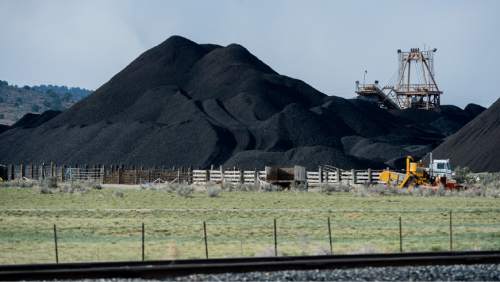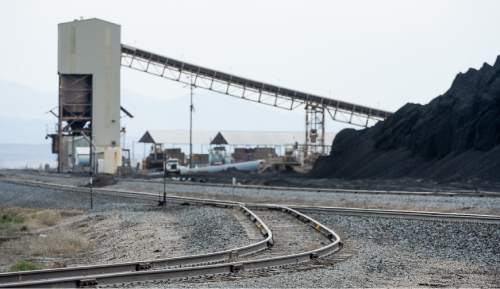This is an archived article that was published on sltrib.com in 2016, and information in the article may be outdated. It is provided only for personal research purposes and may not be reprinted.
Utah's push to export its coal culminated in a raucous Oakland City Council meeting Monday, when officials debated, and ultimately approved, an ordinance banning the chunky fossil fuel from passing through a major deep-water port taking shape on the shores of the Bay Area city.
The coal debate has sharply divided this port city, where people, mostly blacks, flocked in the 1940s for military support and longshoremen jobs along a busy waterfront — but today struggle with poor health measures and stubborn unemployment. Ban backers raised the specter of dust-spewing trains raining coal residue along rail lines to the detriment of public health, while opponents said the ban would needlessly strangle jobs.
After months of study and fielding four hours of impassioned public comments, the council passed in a 7-0 vote the ordinance banning the storage and handling of coal and petroleum coke to resounding applause from the residents packing the council chambers. The council also passed a related resolution applying the ordinance to the Oakland Bulk and Oversized Terminal (OBOT), which four coal-producing Utah counties want to invest in. The measures come back to the council for a second reading July 9.
"We should not depend on coal to be the only mineral to create jobs here in Oakland," high school student Rosaria Sanchez told the council. Nearly 300 people signed up to speak, and most queued up to plead for a ban.
No mitigation, particularly covered rail cars and enclosed storage and conveyors, has been demonstrated to be effective, according to a 163-page report released Friday by a city-hired consultant. OBOT developers accused city officials of rigging the study to lead to a predetermined outcome and vowed to take the city to court.
The move exposes the city, its lawyers warned, to hundreds of millions of dollars of liability for breaching its contract authorizing developer Phil Tagami to build what is known as Oakland Global Trade and Logistics Center on the city-owned former Oakland Army Base at the foot of the Bay Bridge.
OBOT is a $250 million component of Tagami's project, aimed at moving 10 million tons of bulk freight per year. Under a deal with four Utah counties — Carbon, Emery, Sevier and Sanpete — half that capacity would be reserved for Utah products in exchange for $50 million.
Many speakers were unhappy with Tagami, a politically connected developer and friend to California Gov. Jerry Brown, himself a former Oakland mayor, for promising city officials that coal would not be part of the port project before he won approvals to redevelop the decommissioned Army base.
Yet banning coal now risks "unfortunate consequences" for the city, including telling the world Oakland "is not a trustworthy or reliable place to invest or do business in that even city-recognized vested property rights are summarily abandoned in the face of ever-evolving political agendas," attorney David C. Smith wrote in a letter to the City Council on Monday.
Terminal Logistics Solutions, or TLS, the Oakland firm that holds the contract to develop the terminal, is committed to technologies that will exceed environmental and occupational health requirements, according to President and CEO Jerry Bridges.
"TLS will use covered rail cars to deliver all the commodities to the terminal. These covers have proven to be safe and reliable systems for over 40 years, providing an important link in the movement of bulk materials by rail. These covers will all but eliminate any fugitive dust from rail cars," Bridges said. "TLS will also use robust, state-of-the art dust collection control technology in all as aspects of terminal operations to enhance air quality and the safety of employees and the community."
The terminal will employ 2,400 people when it operates, adding 300 vessel calls to the city, according to Bridges.
"This will mean significant opportunities for our local business to service these vessels and their personnel, thus creating additional jobs," Bridges said.
However, coal is rarely handled in enclosed cars and handling facilities Bridges described because suspended coal dust is volatile and leads to explosions in confined spaces, according to Zoe Chafe, a research fellow in public health at the University of California. Utah's high-quality bitumen is even more prone to spontaneous combustion.
A group of local black pastors and community organizers urged the counsel to vote down the anti-coal ordinance, arguing terminal jobs will do more to promote public health than a coal ban. Ronald Muhammad accused the council of hypocritically targeting coal while ignoring so many other problems afflicting West Oakland.
"Where was y'all when they were shipping uranium and GMO corn? You ain't said nothing about that," Muhammad fumed. "We need to work. That's a public health matter. ... Don't be a political prostitute, vote for the damn thing the people need."
Coal supporters chanted "Let us work" as Muhammad left the dais. Moments later when anti-coal speakers offered their comments, Muhammad heckled relentlessly from the balcony and was eventually escorted out.
In explaining their votes, council members rejected the notion that blocking coal would cost desperately needed jobs.
"That's a false choice. The way to the future is clean tech. We have an opportunity to be a leader in this industry," council member Abel Guillen said. "This is not a question about whether the Army base should be developed. This body has already decided that. Tonight we are taking action to protect health and safety of our most vulnerable population."
Council members said they hope for the terminal's success, but indicated the city has established a firm rationale for rejecting coal.
"The land we are talking about is public land for public good," said council member Noel Gallo. "I come from a history where poisoning farm worker was OK. We do need to ban coal in the city of Oakland. We have been at this for a year now."
Tagami's lawyers argued that he holds a vested right to develop the project in whatever way makes economic sense and a prohibition on coal would undermine the project's viability.
"The council and the developer are on collision course to end up in court for a tremendous amount litigation that won't be good for anyone," attorney Gregory McConnell said.
But the Rev. Ken Chambers, of West Side Missionary Baptist Church, offered his own legal counsel to Tagami.
"With the subsidies you have gotten, don't sue," he said. "A lawsuit won't work because we will be right there in court, supporting this council."
Brian Maffly covers public lands for The Salt Lake Tribune. Maffly can be reached at bmaffly@sltrib.com or 801-257-8713.
Twitter: @brianmaffly





